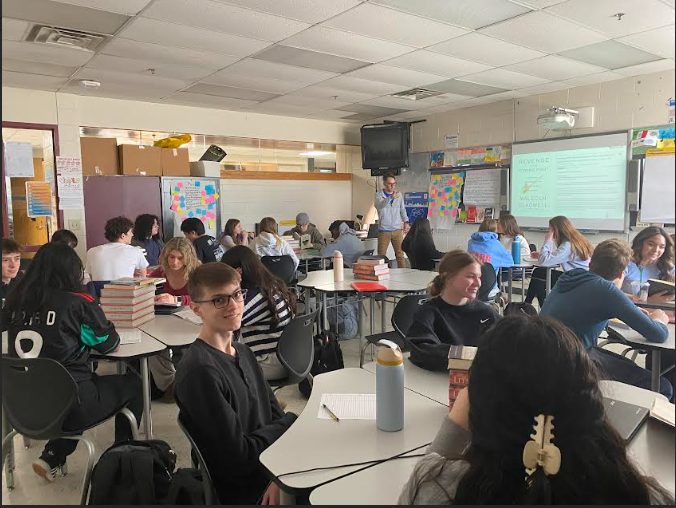Thirty three teachers joined an AI pilot at MHS to investigate the use of AI platforms Brisk Teaching and Magic School. Teachers can use AI to provide students quick feedback, make lesson plans and much more.The purpose of the pilot is to determine which platform works best for teachers and students.
English teacher Colin Franklin, who is involved in the AI pilot, shared that he has already been using AI for a year and half. He explained, “I started out by using Claude for feedback and it slowly morphed into a thought partner, so if I have an unfinished idea, I put it into Chat GPT for a full lesson plan idea.”
Brisk Teaching is an exclusive platform for teachers. It helps teachers with lesson planning, timely feedback to students, AI checking, leveling readings, making quizzes.
Franklin said he has more experience with Brisk and loves everything it does, but has not looked into Magic School as much so far.
He explained that in an active class, it is difficult for a teacher to reach all students in one period for feedback while AI can generate quick feedback which students can utilize earlier on and allows them to have time for editing.
Franklin acknowledged, “It pushes students further than they are able to go which frustrates them.”
However, he mentioned that he allows students to disagree with the feedback it provides with a reason; students are not required to implement the feedback.
English/EL Bilingual Department Chair Diane Covert shared, “AI certainly can help teachers provide timely feedback for first drafts in the writing process. It is impossible, for example, for a teacher with three of the same classes to read and hand back drafts with comments in one day. Whereas teachers who use either Brisk or Magic School can provide AI feedback for all students in a very short period of time. AI can also be a partner in lesson planning and creating creative lessons to increase student engagement.”
While there are some teachers in favor of AI use in class like Franklin and Covert, some other teachers and students are more hesitant in using it in a school environment.
English teacher Ernie Billittier has not implemented AI in his classes because he has not had a chance to explore different AI platforms enough to be comfortable with having it be a part of his class.
He shared his thoughts on AI in school: “For my personal reflections, I have conflicting ideas, every new technology has brought anxiety with it; now that we have technology that can do the work for us, the question is what really is learning.”
According to Billittier, learning is the “liberation of self.” He explained that learning means growth, accumulation of skills and critical thinking and if AI takes over those processes, people would not be learning the same way.
Billittier explained that every class has a different touch to it because of the creativity of each individual teacher. If the same AI plans lessons for each class, he fears that classes would lose their uniqueness.
He added that he enjoys the connections with his students. If the AI started doing work for the teachers, like giving feedback, it would reduce the time teachers have with their students which they could use to build better relationships with them. Although Billittier is hesitant to use AI, he agrees with Franklin and Covert that timely feedback is important when students are drafting papers in the writing process.
Both Franklin and Billittier described “a good and bad faith way” of AI use.
They agreed that if a teacher makes AI grade a whole student paper without taking a look at it, that is the “bad faith way;” however, if they use AI to look at some key points while grading and use those suggestions to help with their decisions, that is the “good faith way” of using it.
Covert added, “We will not allow teachers to use only AI to provide final grades for papers. Nothing should replace teachers reading and providing guidance on final drafts.”
Franklin mentioned that AI can be really beneficial if people use it in the good faith way.
Along with integrity, data security can be a concern with AI in school.
Daniel Crowe, the D120/D75 Chief Information Officer, assured that, “Both Brisk and Magic School have entered into formal agreements with the district to ensure that no personally identifiable information is shared with any other outside third-party vendors.”
Crowe suggested that AI users should review the policies of the AI provider and its reputation to check how their data might get used and how it is stored.
Crowe mentioned, “Limit as much as possible using any personal identifiable information, be selective when determining what files you upload, do not use any documents that contain sensitive data, and look for any options that let you “opt out” of collecting your data….use strong passwords and two-factor authentication whenever possible.”
If implemented correctly, AI can enhance personalized learning, resources which will outweigh the other concerns of academic integrity, privacy and data protection.
“Let AI enhance, not replace you,” Franklin voiced.


